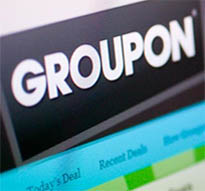Daily deal Internet sites such as Groupon and LivingSocial are popular with consumers, but the extent of benefits for participating merchants — who agree to significant price cuts and experience subsequent social media reviews — remains a subject of debate.
A 2011 paper by researchers from Boston University and Harvard, “Daily Deals: Prediction, Social Diffusion and Reputational Ramifications,” analyzes 16,692 Groupon deals in 20 U.S. cities over six months and 2,609 Living Social deals in the same cities over three months. Researchers focused on sales, the prominence of the featured promotion on deal websites, and the correlation between daily deal sales and the popularity of participating merchants as reflected in Facebook and Yelp ratings and review.
Key study findings include:
- Sales for Groupon (approximately $470,000) and LivingSocial (approximately $125,000) were flat or in decline for the 20 study markets during the study period. When national businesses FTD, The Body Shop and Old Navy participated on Groupon, sales and revenues spiked but returned to their previous levels once the deal ended.
- Daily deal pricing strongly influence sales; while approximately 550 $10 coupons sold during the study period, fewer than 100 $200 coupons sold. Friday deals are typically offered for three consecutive days and outperformed ideals offered on Mondays, which run for one day.
- The placement of a deal on a company website strongly influences both sales and revenue. For instance, featured deals generate more than twice the number of sales as do lower profile deals on the same site.
- Even though deals with limited inventory rarely sell out, “limited deals outperformed unlimited deals on average by 11% more coupon sales and 27% more revenue,” suggesting that Groupon may use the “limited” moniker to encourage sales.
- Based on the high correlation between Facebook “likes” and deal purchases, the researchers conclude that “daily deal sites benefit from significant word-of-mouth effects during sales events.”
- Consistent with daily deal sites’ sales pitches to businesses, Yelp reviews by new customers surge after a deal offering; however, Yelp scores decrease by an average of 0.12 stars subsequent to a Groupon deal.
The researchers comment that “the economic ramifications of reputational effects due to running a daily deal remain uncertain,” and conclude on a cautionary note: lower-than-average Yelp scores “could indicate that a more critical audience is being reached, or that the fit between the merchant and these new customers is more tenuous than with existing customers.”
Tags: economy, technology, business, consumer affairs


Expert Commentary